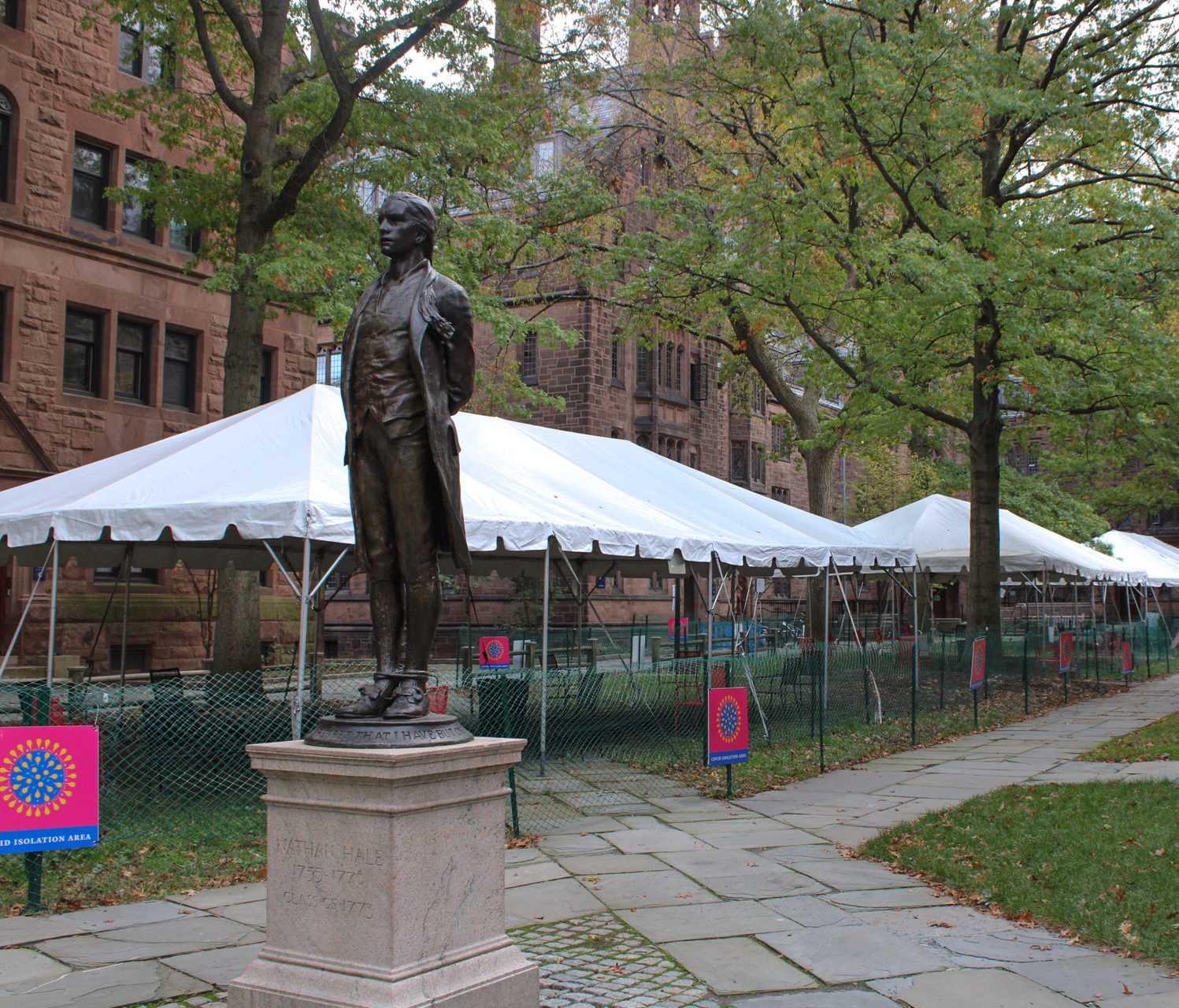
Yasmine Halmane, Contributing Photographer
Yale researchers have identified two unlinked cases of the highly transmissible B.1.1.7 coronavirus variant in New Haven County.
On Thursday, the Grubaugh Lab at Yale discovered that two residents of New Haven County were infected with the B.1.1.7 variant that was first identified in the United Kingdom. The New Haven County residents, both between the ages of 15 and 25, had recently returned from trips to Ireland and New York state, respectively, and developed symptoms shortly after. The two cases, tested at the Yale Pathology Lab, are not related. One individual has completed their isolation period, and the other is self-isolating in their home. Public health officials are interviewing the patients, and contact tracers have alerted the individuals’ close contacts.
“I would say there are very likely more cases than the two that we’ve just found,” said Joseph Fauver, who leads the Grubaugh Lab’s sequencing efforts. “When you start looking, you find things.”
The Grubaugh Lab has been sequencing the SARS-CoV-2 virus genome since the outbreak started in Connecticut, Fauver said. The lab is given discarded clinical samples — the tubes with swabs — from which they extract RNA and sequence the virus genome. This sequencing is a part of the lab’s collaboration with the Connecticut Department of Public Health and the Jackson Laboratory in Farmington, Connecticut.
Last week, those at the lab began searching specifically for the B.1.1.7 variant. They collected patient samples from the Connecticut Department of Public Health, Yale New Haven Hospital and the Yale Pathology Lab.
Researchers at the lab look at the area of the virus genome that codes for the spike protein, which allows the virus to invade human cells. In the genome of the B.1.1.7 variant, there are some missing amino acids in the part of the genome that encodes the virus’ spike protein. This difference is one of the genome’s several distinctive genetic markers, which define it as a variant. The epidemiologists then analyzed where the virus falls on a phylogenetic tree — a diagram that shows the evolutionary relationships and genetic similarity of viral variants.
Yale School of Public Health Department Chair of Epidemiology Albert Ko said that the B.1.1.7 variant is “56 percent more transmissible” than the preexisting variants of coronavirus in the United States. Ko was citing the findings of a study that has not yet undergone peer review conducted by researchers at the London School of Hygiene and Tropical Medicine.
Ko agreed with Fauver that the prevalence of the B.1.1.7 variant in Connecticut is likely higher than the two reported cases in New Haven.
“There’s likely much more out there because we haven’t had systematic surveillance for these strains, and you’re seeing that they’re popping up all over the country,” Ko said.
The Grubaugh Lab recently received a grant to start the Yale SARS-CoV-2 Genomic Surveillance Initiative, a program hoping to establish a more systematic search for the variant and any other lineages that may be circulating.
The lab is also designing PCR tests that can identify the more transmissible variant by its specific genetic markers. Researchers at the lab are sharing information about their protocols online so any other epidemiologists can access it.
Fauver said that hypotheses abound, but it is not yet proven why this variant is more transmissible than other variants of the coronavirus. According to the CDC, there is “no evidence” that the B.1.1.7 variant causes more severe illness or higher risk of death than other variants of coronavirus.
As occurrences of the B.1.1.7 variant increase in the U.S., Fauver said it is still too soon to tell whether the U.S. will have a similar experience to the U.K., which has seen its health systems overwhelmed by the rapid proliferation of the variant.
Ko, who serves on Gov. Ned Lamont’s COVID-19 vaccine advisory group, is optimistic that the Pfizer and Moderna vaccines will still be effective against the variant, and that the same safety measures that public health experts have been pushing for will also help prevent high infection rates of B.1.1.7.
Yale’s Public Health Committee has followed information about the presence and spread of COVID-19 variants including B.1.1.7, and has recommended that the University adapt its protective measures depending on how fast the virus and its variants continue to spread, according to Sandy Bogucki, professor emeritus of emergency medicine. Restrictions — including limited face-to-face contact, quarantine regimens and the use of physical barriers — could be more stringent or more lax come spring.
“This is another reason why everyone should continue taking precautions to prevent transmission of this disease, including wearing face coverings, practicing social distancing, and avoiding gatherings with people outside your household,” Lamont wrote on Twitter Thursday.
Ko emphasized that frequent testing for the coronavirus among members of the Yale community — particularly among graduate students who are not currently subject to routine testing — will be crucial now more than ever. Although genetic sequencing, rather than routine COVID-19 tests, is the definitive way of determining whether an individual is infected with the B.1.1.7 variant, general testing will still help to identify cases of COVID-19 and protect the community at large.
As of Jan. 6, at least 52 cases of the B.1.1.7 variant have been documented in the United States.
Sydney Gray | sydney.gray@yale.edu
Rose Horowitch | rose.horowitch@yale.edu
Correction, Jan. 9: An earlier version of this story said both cases were in New Haven. In fact, both cases were in New Haven County. The story has been updated.







